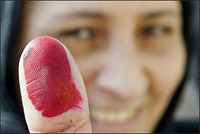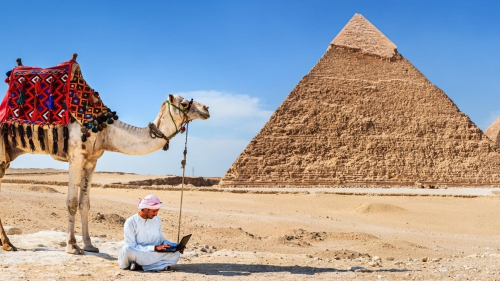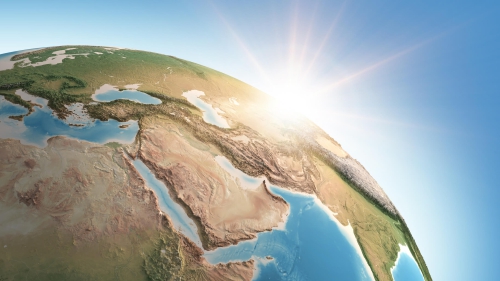Islamic movements and the dangers of electoral politics
 |
According the official account of American policy in the Middle East, one of the Bush administration's main objectives in Iraq is to establish a beacon of freedom and democracy as an example to the rest of the Arab world. That is of course no more than a public-relations sop for particularly gullible observers and the media and analysts who uncritically accept all official pronouncements. The reasons that the US is in fact scared stiff of the possibility of genuine democracy in the Middle East was demonstrated in Egypt last month, when the people of the largest country in the Arab world indicated their support for the Ikhwan al-Muslimeen (the Muslim Brotherhood), the country's oldest and most established Islamic movement, which is officially banned but unofficially tolerated to a degree simply because of the support it enjoys among Egypt's people.
At this article's writing, the Ikhwan had won 76 of the 444 contested seats in Parliament, a far better result than any opposition group had ever achieved against Hosni Mubarak's ruling National Democratic Party (NDP). With another round of polling due to take place early this month, its total standing in Parliament may top 100 seats, compared to the 15 it held in the previous parliament, which had been elected under far more oppressive government restrictions. It should not, however, be thought that these were free elections; they were held under severe restrictions, and under rules designed to ensure victory for the NDP. Once the Ikhwan's strong showing became evident in the first round of polling, the second round was preceded by arrests of Ikhwan activists and security measures designed to prevent Ikhwan supporters from voting.
Although the NDP will continue to hold a massive majority in Parliament, it will have to acknowledge the Ikhwan's standing as the country's main opposition party, and therefore effectively its most popular political force. What form this acknowledgement will take remains to be seen. Officially the Ikhwan remains banned and the government could respond to its successes by cracking down on it again, as it continues to do from time to time. This, however, is dangerous, given the support and popularity that the Ikhwan has proven to have. It would also be embarrassing for the Mubarak regimes's allies in Washington, who would not want to see one of their closest allies being too openly repressive of dissent at a time when they are claiming to be champions of freedom an democracy in the region.
It is more likely, therefore, that the Mubarak regime will try to blunt the Ikhwan's appeal by co-opting it into the official system as a sort of loyal and permanent opposition party. This is precisely what the Jordanian establishment has done in Jordan, where the Ikhwan remains as an opposition of sorts, but often seems to be buttressing the state rather than opposing it. In fact, it is precisely what the Egyptian government has been inching towards in recent years, by allowing the Ikhwan to operate unofficially and dangling the carrot of official recognition if it does not make too much of a nuisance of itself.
The problems of Islamic movements trying to work through electoral processes established and dominated by the existing regimes of Muslim countries have long been recognised. The repeated and total failure of the Jama'at-e Islamic in Pakistan, and the various Islamist parties in Turkey, Malaysia and Indonesia, all point to the same conclusion: that it is virtually impossible for an Islamic movement to break the grip on power currently held by post-colonial regimes by opposing them from within. The experience of Algeria, where the FIS came within a whisker of achieving power through the government's electoral mechanism in 1991, before the elections were declared null and void by the country's military government, launching a civil war that lasted for most of the next decade, is an extreme example. It is unlikely that any genuinely Islamic party or movement will ever again be permitted to get near enough to power for a regime to have to take such direct and drastic acton.
Many Muslims will celebrate the successes of the Ikhwan in Egypt's elections, therefore, and rightly so, as they demonstrate the fact that the ordinary people of the Arab world's most populous and politically important country continue to look to Islam for solutions to their problems, despite the efforts of the government to promote secular ideologies, and of the Americans to discredit Islam by associating it with extremism and terrorism. Nonetheless, there are also worrying signs that the Ikhwan's increasing involvement in electoral politics is blunting its oppositional edge. One example of this came two months ago, in the run-up to the presidential elections, which were carefully timed to take place before the parliamentary ones, to ensure that their results were not distorted by the populist fervour of the more participatory parliamentary polls. At a time when Egyptian opposition leaders were lining up to condemn the polls as hopelessly skewed in Mubarak's favour, and allowing no possibility of his being voted out of office, the Ikhwan were notable by their silence on the subject. This was particularly surprising as they had not even been permitted to run a candidate in the presidential polls. Eventually Ikhwan leaders surprised everyone by suggesting that Egyptians should not boycott the elections, as this would be to spurn a hard-won right. The reasons for this position are clear, of course: the Ikhwan were concerned that too confrontational an approach at that time would endanger their participation in these parliamentary elections, in which they expected to do well.
This episode demonstrates perfectly the main problem of participation in non-Islamic political processes: there is no level of participation that does not involve the acceptance and legitimisation of the framework within which the processes are taking place. Such acceptance, no matter how logical it is it may be on pragmatic, political grounds, inevitably involves compromise not only on pragmatic grounds, but by implication on points of principle as well.
The Ikhwan will undoubtedly be able to achieve short-term progress and objectives from their new position of strength in Egypt's political system, but the system is designed to support the pro-western, secular military establishment, and that will not change. What invariably happens is that it is the Islamic movements that have to change to enable them to operate in the strange seas of secular politics, and in the process they lose the very idealism and principles that gave them their legitimacy and appeal in the first place. The experience of the Jama'at-e Islami in Pakistan is instructive in this regard. Once regarded as the vehicles for an Islamic Revolution in the country, they are now seen as little more than politicians like any other. It is impossible, by contrast, to imagine Imam Khomeini or Imam Khamenei a similar situation; the Islamic Revolution in Iran was based on the principle of totally uncompromising articulation of the principled truth in all circumstances, regardless any short-term political consideration.
As Islamic movements fall into such traps, there are those within them who recognise the dangers and try to redirect the movements towards better paths. Such voices tend to be drowned out in the excitement of short-term successes, but in the long run must emerge, either within the movements in question or outside them, to offer alternative leadership for Muslims seeking Islamic solutions to the problems that they face. If the Ikhwan is to remain the leading edge of Islamic activism in Egypt, these voices must emerge soon; otherwise, it risks being absorbed into the morass of Egyptian politics and rendered irrelevant to the long-term future of Egypt, just as the Jama'at-e Islami is all but irrelevant to the future of Pakistan.
Topics: Egypt, Hosni Mubarak, Ikhwan, Muslim Brotherhood
Views: 4365
Related Suggestions
bibi said, "Have we ever heard in their doctrine protection of human rights and choices, personal freedom and women rights?"
when they say that "Islam is the solution" then this is included therein.
"With this "ideal model" that he constantly fantasies about, we know restricts freedom to write, think or speak..."
so do the secularists.
"Is it Islamic that moderate Muslims cannot contest elections, since the process is designed to favour the most radical and ultra conservative?"
Not necessarily. But the secular systems are the opposites and bar or even kill (e.g. algeria) practicing muslims who do not agree with the general secularization of their government or society. Why do you support their exclusion?
"What is ironic in all his anti-Western rants, is that that enjoys all this right in a western society..."
that's not ironic, it's deliberate. the west will allow you to say whatever you want as long as you do not pose a threat to their dominance. But as soon as you oppose their dominance they will snuff out you and your words expediently. For example, al-qaeda was built and funded by the west and while they were saying "Death to Russia",", they were saying "Death to America". But did the west stop supporting them? No, because they threatened (at the time) their enemy. But as soon as the threats were directed at them, suddenly, al-qaeda is enemy #1. The same with the Israeli support of Hamas in its' beginnings. And why did they do so? To split the Muslims. And so, the west allows people to speak in the west in the hope of dividing the muslims.
Muslim needs to understand one little thing, you are in mess and more you try to clean it worst it gets. Islam was not made for Islamic political parties whoes leaders only have long beards and no brain and not to mention Islamic ideas that are not applied on rest of the people including westren but not to themselves.
Its Time to correct your innerselve and forget about the rest as it is not in your power anyways and anymore(other than the one who have power and no brain). Possibly with next few generations if your raised your generations with correct tools and intellect, it will be all okay.
Another things for fact middle east is not going to be place where Islam or Islamic civilization will re-emerge again. Just get it over with it.
the moslem brotherhood of Egypt and Jama'at-e Islamia of Pakistan did very good jobs untill now. since Islam is Deen and not religion("religion", as the english speaker define it, does not fit 100% to describ Islam.) , they are 100% on the right Track.
the next level of this Islamic movements should be to update their system to fit the future challenges. we all know the oppression practiced against any Islamic movement in middleeast with the blessing of the western democracies. it's time for the moslem brotherhood and others to invest in themselves and avoid discontinuity between the leaders and the base.
one good and strong step toward target is better than many fake steps with possibility of falling.
Though, the concerns of this article seems leigitimate that islamic movements may be diluted while involving in the secular democracy. However, I would disagree with the the article as whole:
1. Claiming that the Jamat in Pakistan is completely failed is not correct. On the face of corrupt political and clan-based leadership, it was only Jamat which stood on its words. On the face of dictatorship and direct US involvment, it is still Jamat which is standing firm on it ideals. It is tough time for an organization like jamat to stand on Islamic issues against military dictator and the self justified murderer on the name of religion. Yes, there are some mistake by Jamat in the past but one cannot ignore there whole achievement.
2. Assuming auotmatically that Ikhwan will be diluted is not correct. In my knowledge it is only Ikhwan who sufferred and tortured so much in our times. Given the sacrifices of Ikhwan it is very unlikely that they will diluted their identity. I would question why IKhwan stood firm on the face on severe peresecution all these years?
3. The article doesnt provide any solution rather leave it to the readers. A normal person would only find armed struggle as an alternative. And we have seen the examples of Afghanistan, Algeria, IRaq as so on.
It is time for us to recognize the difficulty and challenges faced by Islamic movement and support it enthusiastically because that is the only option at the moment.
Salam,
BH.
The reason why Islamist movements are all but irrelevant is because they approached religion from the tail. They have and obsession with articulating a doctrine whose priority is enforcing on Muslims a superficial compliance with Islam, one that is devoid of Islam inherit pluralism, humanism and diversity.
Perhaps Zafar should spell out the details of the 'Islamic solution' that he would visualize it to be. We know what proponents of Islamists movements oppose; however, rarely does one hear the details of what they stand for except for generalization that 'Islam is the solution'. Have we ever heard in their doctrine protection of human rights and choices, personal freedom and women rights? Is the 'Islamic Solution', the ideal Iranian model as he espouses? With this "ideal model" that he constantly fantasies about, we know restricts freedom to write, think or speak. We also know the same Iranian model that practice torture and perpetuate medieval cruelty and barbarity on those that oppose them. Is any of this Islam? Is it Islamic that moderate Muslims cannot contest elections, since the process is designed to favour the most radical and ultra conservative? Do we hear in the Iranian model the Divine attributes such as justice, mercy and compassion?
Zafar has a bipolar view of the world taking from the writings and ideas of Syed Qutb. His vision for Islamist movements would certainly put them in perpetual cycle of irrelevance. What is ironic in all his anti-Western rants, is that that enjoys all this right in a western society, something he will clearly not get in Iran, the model he so idolizes.
B Khan
Canada
Religious leaders lead in the realm of faith and should be firm in their beliefs. Compromise in their eyes show a weakness in faith and should be shunned. Their followers are followers by choice and choose their leaders primarily because of what they believe.
Political leaders, on the other hand, lead in the realm of politics. Politics is necessarily a world of consensus and compromise. A good leader is one who can bring together people of differing opinions and find a compromise that all can live with. A rigid politician becomes either unemployed or a dictator depending on his ruthlessness.
Why can't we have leaders who are strong in their faith but also strong in faith of their fellow man's right to choose faith according to their tradition and conscience? If God gave us the freedom to choose, can't we do likewise to our fellow man? It is possible to be firm in faith but flexible in politics but not vice versa.
The blending of religion and politics is a dangerously explosive mix. It doesn't take much of an historian to see many examples. The biggest mistake any devout person can make is to think that they will be immune to the corrupting nature of having power both politically and religiously. We need to ask of our religious leaders to stick to matters of faith and ask our political leaders to demonstrate their religion by their actions and not their rhetoric and legal fiat.
Salaam aleikum,
Very well written article but the author left out other recent elections:
1. Hamas's participation in the PNA sponsored election, without Hamas's participation the PNA would have had NO legitimacy to sell Palestine to the Israelis on behalf of the Muslims in Palestine. However, following their recent electoral gains, the EU has already laid out a threat that all funding will be cut off unless Hamas "renounces violence"...no such demands are going to be made on the Israeli side (and even if they were, Sharon has said they will never comply anyhow).
2. Iraq, once again look at how the U.S. went out of its way to appease and cajole the Sunnis and other groups to participate. Following the participation however, very little if anything is going to change with the occupation even less if anything should change in terms of the oil being pumped out by U.S. multinationals or reconstruction projects in the country being honored in a "no-bid" fashion. The parliament is essentially a toothless body designed to give legitimacy to the status quo.

















